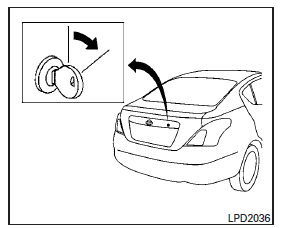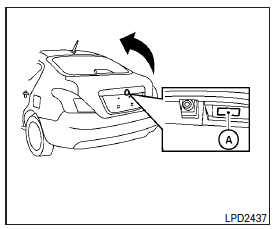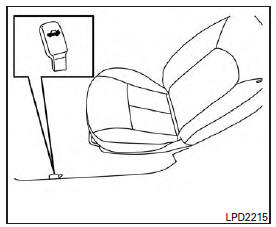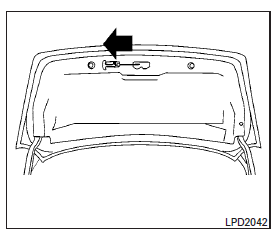Nissan Versa (N17): Trunk lid
WARNING
- Do not drive with the trunk lid open. This could allow dangerous exhaust gases to be drawn into the vehicle. For additional information, refer to "Exhaust gas (carbon monoxide)" in the "Starting and driving" section of this manual.
- Closely supervise children when they
are around cars to prevent them from
playing and becoming locked in the
trunk where they could be seriously injured.
Keep the car locked, with the rear seatback and trunk lid securely latched when not in use, and prevent children's access to car keys.
Key operation

To open the trunk lid, turn the key clockwise. To close the trunk lid, lower and push the trunk lid down securely.
Opening the trunk lid

To open the trunk, unlock it with one of the following operations:
- Unlock the trunk using the key.
- Pull up on the opener lever (if so equipped) located on the floor next to the driver's seat.
- Press the button on the Intelligent Key.
- Push the A release switch.
Opener operation (if so equipped)

WARNING
- Do not drive with the trunk lid open. This could allow dangerous exhaust gases to be drawn into the vehicle. For additional information, refer to "Exhaust gas (carbon monoxide)" in the "Starting and driving" section of this manual.
- Closely supervise children when they
are around cars to prevent them from
playing and becoming locked in the
trunk where they could be seriously injured.
Keep the car locked, with the rear seatback and trunk lid securely latched when not in use, and prevent children's access to car keys.
The trunk lid release is located on the floor to the left of the driver's seat.
To open the trunk lid, pull the opener lever up.
To close the trunk lid, lower and push the trunk lid down securely.
Interior trunk lid release

WARNING
Closely supervise children when they are around cars to prevent them from playing and becoming locked in the trunk where they could be seriously injured. Keep the car locked, with the rear seatback and trunk lid securely latched when not in use, and prevent children's access to car keys.
The interior trunk lid release mechanism provides a means of escape for children and adults in the event they become locked inside the trunk.
To open the trunk from the inside, pull the illuminated release handle until the lock releases and push up on the trunk lid. The release handle is made of a material that glows in the dark after a brief exposure to ambient light.
The handle is located inside the trunk compartment on the trunk lock at the center of the trunk lid.
 Hood
Hood
1. Pull the hood lock release handle 1 located below the instrument panel until the hood springs up slightly. 2. Locate the lever 2 in between the hood and grille and push the lever sideways w ...
Fuel-filler door
Opener operation The fuel-filler door release is located below the instrument panel. To open the fuel-filler door, pull the release. To lock, close the fuel-filler door securely. Fuel-filler ...
Other materials:
Installing front license plate
Use the following steps to mount the front license
plate:
Before mounting the license plate, confirm that
the following parts are enclosed in the plastic
bag:
License plate bracket
License plate bracket screws x 2
Screw grommets x 2
1. Hold the license plate bracket 1 and make
a ...
Preparation
Special Service Tools
The actual shapes of KentMoore tools may differ from those of special
service tools illustrated here.
Tool number
(KentMoore No.)
Tool name
Description
KV10111100
(J37228)
Seal cutter
Removing oil pan (lower and upper) etc.
...
Categories
- Manuals Home
- Nissan Versa Owners Manual
- Nissan Versa Service Manual
- Video Guides
- Questions & Answers
- External Resources
- Latest Updates
- Most Popular
- Sitemap
- Search the site
- Privacy Policy
- Contact Us
0.0123
